Monday August 2, 2010
Georgia has returned to the top of the Princeton Review’s list of party schools. The tradition is upheld at North Campus tailgates, across the football team, and right up to the athletic director’s office. That’s how you win – it takes a campus-wide commitment. Michael Adams, banging his head against office furniture, could not be reached for comment.
Wednesday April 28, 2010
Students in Athens learned on Tuesday about a revision to the University’s Code of Conduct that covers drug and alcohol incidents. The previous policy called for an automatic suspension from the University upon a second drug- or alcohol-related arrest during a probationary period which followed the first arrest.
That automatic suspension is gone. Instead, “under the new system, hearing panels from the Office of Judicial Programs will have more authority to regulate punishments suitable for specific cases.” University president Michael Adams warns students not to consider the change “a free pass on alcohol violations.” In fact, the greater latitude given to disciplinary panels might allow for “even more significant penalties” based on the severity of the incident.
The flexibility in the new policy “was designed to differentiate between a student caught with a beer in a dorm refrigerator and a DUI-related offense.” Vice President for Student Affairs Rodney Bennett expects that “the changes will ease and reduce the number of minor incidents that clog the system under the old rules, and it will allow officials to focus more effectively on the more serious alcohol and drug violations.”
This change in policy is significant for student-athletes because, well, it’s kind of hard to participate in a sport if you’re suspended for a semester. A second arrest during his or her probationary period was essentially an automatic season-long suspension for a student-athlete. To be clear – the revised policy does not mean lighter discipline for drug or alcohol-related incidents, and we’re not even talking about what a coach might decide to do based on program or athletic department guidelines. But the change to the University policy does allow the disciplinary panels to consider alternatives and also take into account the severity of the incident.
Senior linebacker Akeem Hebron experienced the consequences of the old policy. Hebron was arrested twice during the early part of 2007 for underage possession of alcohol. The second arrest triggered the automatic semester suspension meaning that he’d miss the 2007 fall semester – basically his entire redshirt freshman season. Instead of remaining inactive he transferred to Georgia Military College for the 2007 season.
To his credit, Hebron kept clean, remained on track academically, and was accepted back to the University and the Georgia football program in time for the 2008 season. His story since has been one of perseverance. He was a promising prospect regarded as highly as Stafford, Moreno, and Rashad Jones from the 2006 class. He was mentioned as a possible starter headed into 2007 before his suspension. He had a promising return in the 2008 G-Day game, but a fracture dislocation of the left ankle at LSU ended his 2008 season and put him at a big disadvantage for the 2009 season. He missed all of spring practice in 2009 and had a minimal impact before recording three tackles in the bowl game.
We can’t speculate on how Hebron might’ve been handled under the new policy. Causing a disturbance while underage and intoxicated downtown is somewhere between “a beer in a dorm refrigerator” and a DUI, and a long-term suspension might have come down from either the University or coach anyway. It’s now Hebron’s senior season, and it’s been a long way back from suspension and injury. He hopes to find success in the new scheme with a new coach, but he’s currently listed third at one of the inside linebacker spots.
Thursday March 18, 2010
Call it overkill, but UGA is pushing back against the tailgating problems on North Campus. New rules put into place for the 2010 season will all but eliminate tailgating on North Campus:
- Tailgating on North Campus will be allowed beginning four (4) hours before kickoff.
- The following items will not be allowed on North Campus on gamedays:
- Tents
- Kegs
- Generators
- Televisions
- Amplified music
- Grills or cookers of any type
- Tables larger than 4 ft. long
- Household furniture (folding chairs not included)
What’s considered “North Campus?” This area:
North Campus is defined as the area bounded by Broad Street, Lumpkin Street, Baldwin Street and Jackson Street (including, but not limited to, the quadrangle between Broad Street and Old College, the quadrangle between Old College and the Main Library, and Herty Field).
But it’s not just North Campus affected by new rules for 2010. These following changes will apply to “all parking areas” controlled by UGA:
- No pull-behind items (trailers, cookers, etc.)
- No golf carts or ATVs
- No parking on sidewalks (expanded to include Carlton St.)
- The ban on setting up tailgates (tents, tables, etc.) in parking spaces will be reemphasized, to include those areas controlled by the Athletic Association.
With so much of tailgating already pushed to the periphery of campus due to the Athletic Association, these additional changes will only serve to push people further off campus. Downtown can’t handle the crush of people. It’s not as if people are going to start waiting until 4 hours before kickoff to come to Athens – traffic won’t allow it. The one thing helping congestion prior to games was that arrival could be spaced out across the day, especially for later kickoffs. Compressing that down to a few hours will push people off campus and onto the streets which will not be able to handle the overflow.
We’ve maintained that many problems could have been avoided with stricter enforcement of existing laws (underage possession and littering chief among them), but it sounds as if the University has gone with the nuclear option here. You can’t say we weren’t warned…North Campus tailgaters have been urged to clean up their act for several years now. I’m glad we tailgate off-campus, but it looks as if we’ll have a lot more company soon.
Wednesday January 27, 2010
Today is Founder’s Day at the University of Georgia: 225 years ago today, the state legislature approved the charter that made the University of the Georgia America’s first state-chartered university. Anyone have 225 candles?
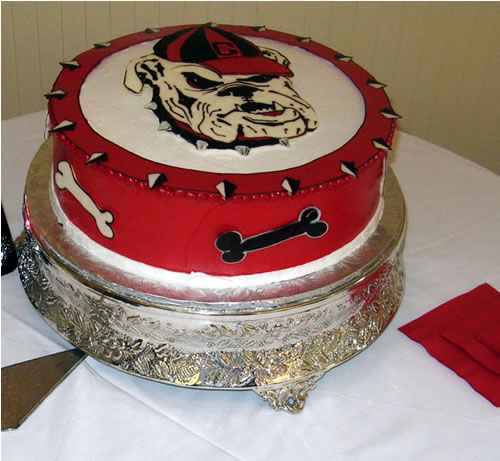
Wednesday September 23, 2009
The big news would have been a decision to disrupt the tradition of the Georgia-Florida game in Jacksonville, but the UGA Athletic Association Board of Directors approved Damon Evans’ recommendation to negotiate for a continuation of the series at its current location through 2016.
The ABH also notes via its Twitter feed that “the team will begin flying direct from Athens to Jacksonville,” cutting out the bus trip to Atlanta and making the overall trip that much shorter.
In addition to the WLOCP news, funds were approved “to develop plans for two facility enhancement projects.” Both fit into a master plan outlined by the Athens Banner-Herald a year ago.
Basketball fans will be glad to hear that one of the projects was “a Stegeman Coliseum concourse renovation and expansion.” Anyone who’s been inside the Coliseum could tell you how badly this project is needed. The inside seating area has been addressed over the years and isn’t all that bad, but the concourse and entryway haven’t received much more than a coat of paint and new signage. The rationale behind the project is laid out well by PWD here – note the use of glass walls in the conceptual drawings that will widen and brighten up the concourses.
The project is also a sign that a tear-down or major renovation of Stegeman isn’t coming any time soon, but we knew that. This news follows through on Dennis Felton’s claims last year that “Damon Evans wants to renovate Stegeman sooner rather than later.”
The other project is “a project behind the north stands of Sanford Stadium that would provide a multi-function amenity supporting both the game day event and the campus on non-event days.” The idea of “Reed Alley” has been talked about for over seven years now, and it was part of the plans for the 600-level expansion of Sanford Stadium earlier this decade. The idea involves improving the area between the stadium and Reed Hall, using it as a wide pedestrian mall connecting East Campus Rd. and the Tate Center during the 359 days without football, and then using it as a wide open lower-level concourse on game days with vendors and such. The 600 level was built with this area in mind, and this project will be finishing off the vision.
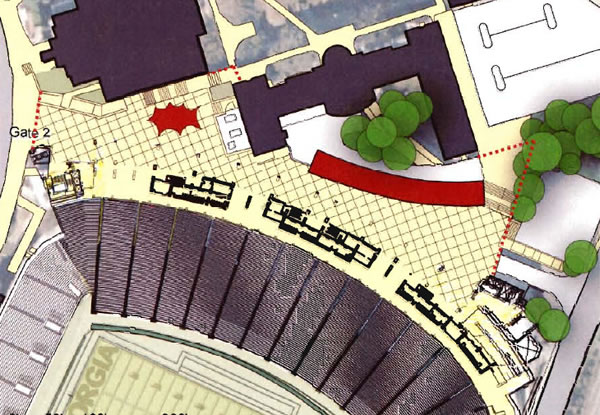
Location of Reed Alley
Wednesday September 23, 2009
The University is taking steps to address the North Campus trash problem, but it’s still going to come down to people doing the right thing:
The university plans to distribute 12,000 trash bags in parking lots and around campus this Saturday before the Georgia Bulldogs play host to the Arizona State Sun Devils in a 7 p.m. kickoff. Volunteers from the Fellowship of Christian Athletes will walk through tailgating areas distributing trash bags and encouraging tailgaters to bag their trash and deposit it in an appropriate receptacle. The number of disposable trash boxes on North Campus will be increased to 400 from the previous 250, and over the entire campus to 1,500 from the previous 1,200. Several large roll-off dumpsters will be placed strategically around campus for tailgaters to dispose of their bagged trash.
Additionally, the firm that contracts to clean the campus on Sundays following a football game – American Stadiums – will send crews on an initial sweep through North Campus during the first quarter of remaining games this season to pick up trash already collected and set aside by tailgaters.
The number of Port-a-Johns available on campus also will be increased, particularly in the North Campus area, which has been problematic.
Those are necessary and welcome actions – there really won’t be much excuse for people not to clean up after themselves. You can be certain that every media outlet is standing by to do a story on the state of campus come Sunday morning, and a lack of significant improvement will just bring more scrutiny and tighter restrictions.
The real test of these measures will come the following week when LSU visits. Fortunately that’s a 3:30 kickoff. Arizona State will be a decent first run, but it should be a lower-key tailgate than South Carolina or LSU especially if the predicted rain materializes this weekend.
Thursday September 17, 2009
UGA President Michael Adams gave fans what amounted to a stern talking-to this morning and warned Bulldog fans to clean up after themselves in the wake of another trashed campus following Saturday’s game.
“There are other things we can do [if the situation doesn’t improve],” Adams said. “I don’t want to start arresting people or have a heavy police presence. We simply ask people to spend a little more time to maintain our campus.”
Adams’ warnings sound menacing, but “a heavy police presence” is already noted in everything from open container citations to parking enforcement. If UGA and Athens-Clarke County police are going to be so involved in those other areas of game day crowd control, why isn’t it appropriate to include them as part of a solution to a chronic littering problem on campus?
His plea is definitely called for and appropriate, and he’s correct that “the students and alumni of the university are demanding some changes in behavior.” Whether the problem is alumni, students, or nonstudents just coming to Athens for the party, the reaction of disgust this week has been pretty universal. But why shy away from enforcement on this issue with so many fans, students, and alumni in your corner?
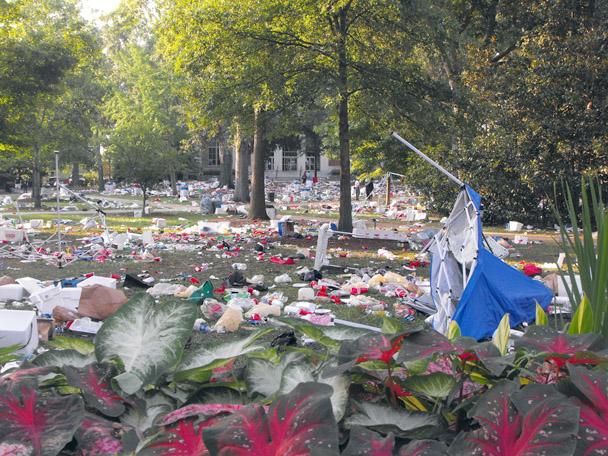
Photo: AJC
Tuesday September 15, 2009
You kind of wish some people were charged much more for the privilege of parking and tailgating on campus after seeing these results. Disgusting and embarrassing.
Tuesday September 15, 2009
Buried in a Saturday ABH article about tailgating was this note:
Athens-Clarke officials voted to hike city parking fees and fines this spring, doubling the price for football parking in the city’s downtown deck from $20 to $40. Some private lots have followed suit and raised prices.
Sure enough, as I drove along Hancock Street coming through downtown, I saw lot after lot operated by Prestige Parking charging $40 for a day’s worth of parking. The first move in this doubling of rates came from Athens-Clarke at the suggestion of the Athens Downtown Development Authority. The $40 game day rate approved by the city for the College Avenue Parking Deck is just $16.25 less than the monthly rate for that deck.
They can charge what they like of course, and there are ways to park in or near downtown for less if you’re early/resourceful enough. Due to the actions of the ADDA, I’ll avoid spending money in the downtown central business district during the season. It’s not a lot, but it certainly would be more than the $240 they’re asking for a season’s worth of downtown parking.
Friday September 11, 2009
For many of us, the home opener is about getting back to Athens and reconnecting with the town, campus, and friends that make the whole experience much more than just a sporting event. It shouldn’t surprise anyone that the campus and town continue to change between our visits, and there has definitely been some work done since the end of last season. As always, we recommend visiting the Gameday Gameplan site for specifics about enjoying Saturday in Athens, but here are a few of the highlights of some of the changes:
Tate Center Expansion
We mentioned this over the summer, but the opening of the Tate Center expansion will be a big change for the fans who like to gather and shop around the central campus in the shadow of the west side of Sanford Stadium. It will also make for a slightly different Dawg Walk, but more on that in a second.
In addition to being a boon for current students, the space added by the expansion will provide a lot more indoor space for fans on game days. The best part of the addition, at least from a fan’s point of view, might be the 24-foot projection TV screen in the third-floor lobby. Hang out there and watch other games or even the Georgia game if you don’t have a ticket. There’s also a parking deck underneath the structure, but that’s not an entirely new feature.
The new buildings and the loss of the open parking lot means that the corridor for the Dawg Walk will be a bit narrower than it’s been in recent years. One big plus of the new buildings is multiple levels from which to line the walkway and get a good look at the Dawg Walk. The expansion might even serve to shift the focus of the Walk from the original Tate Center back closer towards the Lumpkin Street end.
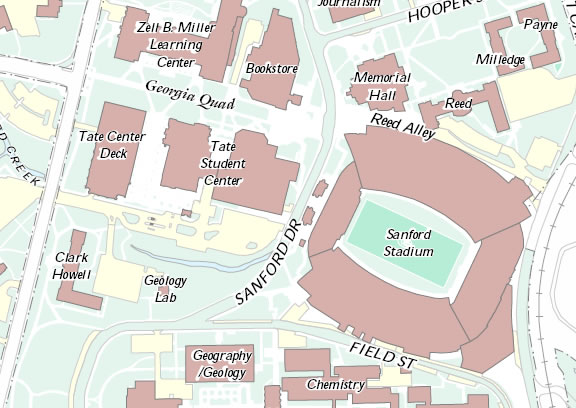
East Campus Construction
If you haven’t been on East Campus since last season, it’s quite a dramatic change. A new Greek Park has been opened along River Road not far from its terminus at East Campus Road around where the ATO house used to be. It currently houses four fraternities. Unfortunately the complex took out a lot of the older landscape of that part of campus to go along with the older house, so it’s a pretty stark place for now.
More construction is taking place further down River Rd. Buildings in the new Performing Arts Center have taken most of the open surface parking in that part of East Campus, and work is underway for a new parking deck to be located back behind the Performing Arts building. That deck is expected to be completed in November. There is still some surface parking available in the area, but it might not be as available or as accessible as you remember it.
Gameday Experience
Not much has changed this year with regards to campus tailgating regulations. It’s still the same 7 a.m. start time. One thing that caught my eye was a specific prohibition on “low country boils.” I remember deep fryers being prohibited, but the low country boil regulation is a new one I think. Apparently the boiling of water is something best left to the professionals. (Thank goodness we tailgate off-campus.)
One small change I noticed on the parking maps: the small North Campus lot behind Baldwin Hall was a hidden gem for several of my friends – a free lot close to the stadium. That lot is now controlled by the Athletic Association and will require a permit.
Thursday June 4, 2009
The University of Georgia officially opened the Tate Center Expansion this week, and the building promises lots of additional meeting and event space, services, and amenities for students (at a $60 million price tag). A more formal ribbon-cutting will take place later in the summer.
That’s great for the students, but as selfish alums and football fans, what’s in it for us? Several things:
- Lots of additional indoor space near the stadium in which to hang out on game day. Large open areas seem ready-made for a large crowd waiting for a football game. “The Tate addition is so football-friendly, one student exploring the expansion wondered out loud if the building were designed with football Saturdays in mind.”
- While you’re inside staying cool or just killing time before the game, check out the 24-foot projection TV screen in the third-floor lobby. If you can’t make it into the game, they’ll be showing it on this screen. Yes, 24 feet of Gameday goodness.
- Several hundred parking spaces were lost when this construction took away the better part of the Stegeman Hall parking lot, but this facility includes a 508-spot parking deck that will surely be used for premium (and perhaps handicapped) parking on game days.
One other effect of the Tate expansion will be to refocus the Dawg Walk. We’ve looked before at how this building will play a role in the continued revitalization of the central campus. Though the project is nowhere near complete, a future Alumni Development Center between the Tate Center and Lumpkin Street as well as an “Alumni Quad” between the two buildings will form the heart of a central campus park complete with a Dawg Walk Overlook. The sketch below shows where this is (tentatively) headed.
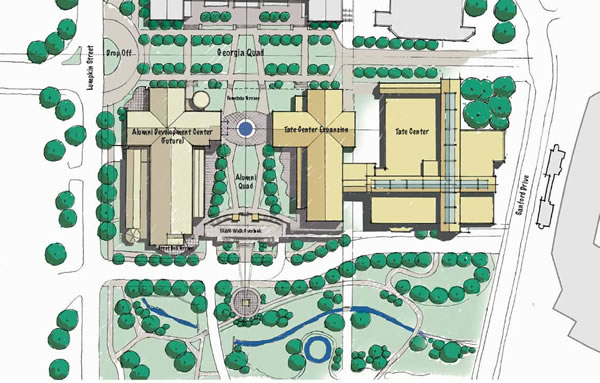
Click for a much larger version.
Thursday April 23, 2009
Even with the future of print journalism in the air, the University of Georgia’s
Grady College of Journalism and Mass Communication is proposing a new program
focusing
on a very specific discipline.
The Grady College of Journalism and Mass Communication is proposing the development
of a sports writing program, marrying the University’s outstanding athletic
program with the nationally-recognized journalism school. … The program
will teach students how to cover sports for a range of mediums, including
television, newspapers and the Internet.
Citing huge student demand, Grady professor Conrad Fink says that the program
would likely start small as a "certificate program."
Details are a bit sketchy. Would the focus be on basic journalism enhanced
by courses dealing with specific sports? Would students learning from and working
with athletic department resources still be able to practice their skills on
the Bulldog program independently?
That last point was lesson #1 for
a broadcast journalism major at TCU: when you’re using university resources,
lay off the starting QB.
Thursday March 5, 2009
A quick two-game winning streak to finish the regular season snapped an unprecedented
five-game losing streak and put the Lady Dogs squarely in the middle of the
SEC standings entering this season’s SEC Tournament in Little Rock which gets underway today. In most
seasons the SEC Tournament is a formality for Georgia, but the mission is much
different this year. There’s no question that the Lady Dogs must turn some heads
this weekend in order to earn an NCAA Tournament bid and avoid missing the national
tournament for only the third time in program history.
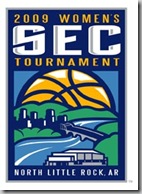
Georgia heads to Little Rock as a classic bubble team: several impressive wins
and several devastating losses. First, the good: three wins over ranked teams
who are also three of the top four SEC seeds. The bad: losses to Ole Miss and
Arkansas, a late-season five-game losing streak, and five nonconference losses
against a pretty weak slate. In a sub-par season by Georgia standards, the Lady
Dogs have occasionally thrilled and often disappointed. They’ve shown that they
can beat the teams that stand between them and the semifinals, but with the
WNIT not an option do they have a season-saving run left in them?
After several seasons of LSU and Tennessee duking it out for top honors in
the conference, both of those powerhouse programs are rebuilding this year.
That has allowed a bit of a shakeup in the SEC standings this year, and names
like Bonner, Wirth, and Dotson have taken over for Parker and Fowles. The biggest
difference this year is that the SEC hasn’t proven to have a national contender.
Auburn is a Top 5 team with only two losses, but their only real nonconference
test was Ohio State. No one else has looked like more than a Sweet 16 team.
Auburn won the regular season title with room to spare, and they avoided the
slumps that can get to the best of teams. Now they get to deal with the pressure
of the top seed. That might not be a big deal for some of the other top seeds
who are more used to the spotlight, but Auburn was just the sixth seed last
year. This is a talented team in new territory as the favorite, and we don’t
know how they’ll respond.
Back for its third season is my breakdown of the SEC Women’s Tournament field.
The Favorite
- #1 Auburn (12-2). The dominant play of Auburn has been
the story of the season. They raced to a 20-0 start punctuated by a 82-68
dismantling of Tennessee. Setbacks to decent Vanderbilt and Georgia teams
come with the territory and showed some vulnerabilities, but the Tigers have
been the class of the league this year. Likely SEC Player of the Year DeWanna
Bonner leads the way at forward, but solid guard play provides nice balance.
Contenders
- #2 Vanderbilt (10-4). With wins over Tennessee, LSU, Auburn,
and Florida, you’d expect Vandy to be one of the favorites to win the tournament.
They’ve already beaten the rest of the top seeds. But puzzling losses to teams
like Georgia, Ole Miss, and Mississippi State show that there isn’t much margin
for error for this team. If Vanderbilt has a glaring weakness, it’s lack of
size. They rely a lot on the potent outside shooting of Wirth and Marsh and
depend on effort and position from an undersized frontcourt for points and
rebounds inside. In the season finale, they were outrebounded 45-23 by Tennessee
yet weren’t that far away from winning in Knoxville. Bigger opponents can
be effective inside against Vandy, but the Commodores usually shoot and defend
well enough to handle most SEC teams.
- #3 LSU (10-4). A few weeks ago, LSU was 5-4 in the SEC
with games left against, among others, Florida, Georgia, and Tennessee. Van
Chancellor’s team had massive turnover after saying goodbye to seven seniors
last year, and true freshmen now make up the bulk of the LSU lineup with the
exception of standout guard Allison Hightower. The Tigers took their lumps
early in the season, but since that 5-4 record they’ve won five straight and
have vaulted from the bubble to become one of the SEC’s stronger teams. They
still play tough defense, keep the scoring low, and have found enough offense
to stand as one of the hotter teams entering the tournament. That winning
streak will likely be tested on Friday by Mississippi State who beat LSU twice
during the regular season.
- #4 Florida (9-5). If any team could challenge Auburn for
the best start to the season, it was Florida with their 22-2 record. A lone
road loss at Auburn was their only SEC blemish. But since Feb. 12, Florida
has lost four of five games and slid from a likely #2 seed to a shaky #4 seed.
Defense has become spotty; opponents scored over 80 points in three of those
four losses. The Gators were the #11 seed just two years ago, and their rapid
rise might have led them to think they were better than they were. Still,
this is a team that has impressive wins over FSU, Pitt, Arizona State, and
Tennessee. But if they don’t snap out of this recent funk, they might not
survive a Friday rematch with Tennessee.
- #5 Tennessee (9-5). It’s been a down season by Tennessee
standards, but you still have to include them as a contender. For only the
second time in program history they aren’t among the top four seeds and will
have to play on Thursday. Tennessee, like LSU, lost a tremendous amount of
talent from last season, and they’ve had their difficulties getting the newcomers
to play at a consistently high level. They’ve been prone to significant lapses
in scoring and have had to rely on effort in defense and rebounding to keep
them in a lot of games. That effort has been hit or miss at times, and it’s
been frustrating to Pat Summitt to have to coach effort out of her young team.
They’ll surely be up for the tournament and should have no problems with Alabama,
but after that they’ll have to avenge regular season losses in order to advance.
It’s been that kind of season where I wouldn’t be surprised to see Tennessee
reach the finals…or get bounced on Friday.
Looking to make noise
- #6 Mississippi State (8-6). At 21-8 overall and 8-6 in
the SEC, MSU seems set in the NCAA Tournament. They have a season sweep of
LSU and a win over Vanderbilt to their credit, and they have really no bad
losses. Even a close loss to Arkansas doesn’t seem that bad now. If seeding
holds, the path to the finals goes through three teams they’ve beaten during
the regular season. The possibility is there for a big improvement in NCAA
seeding if they can make a deep run. Alexis Rack will shoot the ball from
anywhere on the court. If she’s hot, look out. If not, they won’t last long.
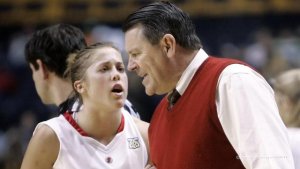 |
| Please, sir, just 30 seconds of rest… |
On the bubble
- #7 Georgia (7-7). After getting swept in two games against
Kentucky (including an SEC Tournament loss) last season, the Lady Dogs hope
to return the favor this year. Thanks to the clutch play of Ashley Houts,
Georgia emerged with a win in Lexington just a week ago. But it wasn’t easy
or pretty. Houts will be key again in the rematch against a relatively weak
UK backcourt. Phillips and Robinson can match up with Kentucky’s strong frontcourt,
but they’ll need to avoid foul trouble. When Houts, Phillips, and Robinson
play well, Georgia is usually successful. When they get that plus a contribution
from Marshall and/or Puleo, they can run with any team in the league. The
biggest danger sign is early foul trouble on a post player, and a sloppy night
from Houts usually means disaster. Kentucky tried to focus on stopping Houts
last week, and she still came up big. They’ll likely try the same strategy
in the rematch, and she’ll need to be every bit as determined this time around.
Win and the postseason hopes remain alive. Lose and the season is over.
Spoilers
- #8 Arkansas (6-8). Before losing badly to Auburn in the
regular season finale, Arkansas had reeled off five straight wins to overcome
a 1-7 SEC start and climb out of the cellar. During their winning streak they
knocked off Georgia and Florida. They’re athletic and play straightforward
without any complicated offense, and they’ve been an interesting story down
the stretch. But it’s unlikely that they’ll get past Auburn on Friday.
- #9 Ole Miss (5-9). Wins over Georgia and Vanderbilt highlight
an otherwise unremarkable season for Ole Miss. They’ve looked dangerous in
close losses at Tennessee and Auburn but have shown no consistency. They lost
by 11 to Arkansas just a few weeks ago, and they’ll have to come up with some
more road toughness to survive another game with Arkansas in Little Rock.
- #10 Kentucky (5-9). The Cats were the #4 seed last year
and lost a bit of talent, but a win over Tennessee proved that they still
have some punch. They don’t score or shoot particularly well, but they can
rebound and play quality defense. Their frontcourt can match up with most
in the league. Victoria Dunlap is the SEC’s top rebounder in addition to being
a productive scorer, and wing Amani Franklin is a dangerous player who can
score inside or outside.
Didn’t make hotel reservations
- #11 South Carolina (2-12). At times, South Carolina has
been able to put a scare into SEC teams. They came within four points of Auburn,
six points of Georgia, ten points of Vandy, and seven points of LSU. They
have the ability to challenge Mississippi State on Thursday but likely won’t
get past a motivated opponent.
- #12 Alabama (1-13). The Tide have had a single SEC win
in each of the past two seasons. They won’t improve on that against an angry
Tennessee team.
Monday June 9, 2008
Sometimes the events just speak for themselves:
Georgia Bulldogs 1st – Peisel singled to right field (1-0 B). Olson hit
by pitch (2-0 B); Peisel advanced to second. Beckham walked (3-1 BBBKB); Olson
advanced to second; Peisel advanced to third. Poythress walked, RBI (3-1
BBKBB); Beckham advanced to second; Olson advanced to third; Peisel scored.
Massanari singled to left field, 2 RBI (1-1 KB); Poythress advanced to second;
Beckham scored; Olson scored. Brown to p for Surkamp. Cerione singled, bunt
(0-0); Massanari advanced to second; Poythress advanced to third. O’Bryan
grounded out to 3b, RBI (2-2 KBSB); Cerione advanced to second; Massanari
advanced to third; Poythress scored. Allen singled to center field, 2 RBI (0-1
F); Cerione scored; Massanari scored. Thoms singled to left field (0-0); Allen
advanced to second. Peisel singled to right field (1-2 BKFF); Thoms advanced to
second; Allen advanced to third. Olson flied out to lf, SF, RBI (2-2 KBSB);
Allen scored. Beckham singled to left field, RBI (0-0); Peisel advanced to
second; Thoms scored. Poythress singled through the left side, RBI (0-1 K);
Beckham advanced to third; Peisel scored. Cutler to p for Brown. Massanari
reached on a fielder’s choice (0-1 F); Poythress out at second ss to 2b.
9
runs, 8 hits, 0 errors, 2 LOB.
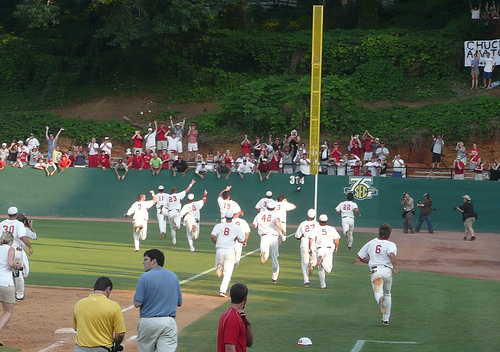
|
 We’re #1!
We’re #1!









 Dawg Media
Dawg Media